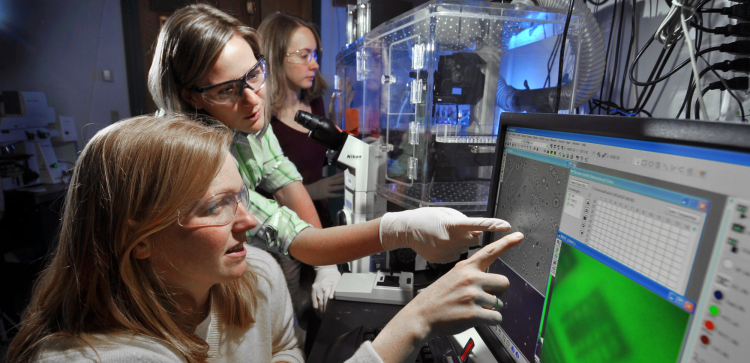CU Boulder attracts a record $631 million in annual research funding

CU Boulder research attracted a record $631 million in funding in fiscal year 2019 for groundbreaking studies that investigate a changing environment, explore new opportunities in space, mitigate the effects of natural hazards, advance biomedical research and seek cleaner, more sustainable energy solutions.
The total tops last year’s $511 million in sponsored research funding across the university and represents a 21% increase in federal funding and an increase of 30% in non-federal funding.
CU Boulder obtained grants from a range of government agencies, non-profit organizations and industry partners. NASA, National Science Foundation (NSF), Department of Commerce, National Institutes of Health (NIH) and the Department of Defense continue to be the largest funding sources for CU Boulder awards.
“We’re delighted to secure more than a 20% increase in our research funding, especially given the highly competitive funding environment,” said Terri Fiez, vice chancellor for Research and Innovation. “The growth of our research enterprise reflects the quality of new faculty we are hiring, the strategic collaborations we are advancing and our continued focus on research that really matters.”
Together, the CU system’s four Colorado campuses obtained $1.2 billion in awards, the third year in a row these totals climbed above $1 billion.
“CU’s record-setting research funding demonstrates the high quality of our faculty, whose work in discovery and innovation improves lives, saves lives and addresses some of the most pressing issues facing society,” said CU President Mark Kennedy. “Their work not only enhances the educational experience for our students, but also makes our world a better place.”
Examples of recent sponsored research projects at CU Boulder include:
Leading the way in environmental science
The U.S. Geological Survey selected the University of Colorado Boulder to host the North Central Climate Adaptation Science Center (NCCASC) for the next five years. NCCASC Director Jennifer Balch, an assistant professor of geography at CU Boulder and director of CIRES’ Earth Lab, said the new, $4.5-million award recognizes the huge potential for synergy with existing campus programs and expertise. The center is one of eight regional climate centers created to help meet the changing needs of land and resource managers across the country; the North Central center serves Colorado, Wyoming, Montana, North Dakota, South Dakota, Kansas and Nebraska.
Advancing understanding of the universe with CubeSats and UV spectrometers
Miniaturized satellites, or CubeSats, have become a core component of space exploration because they reduce costs and development times while increasing flexibility and opportunities to integrate new technologies. Ultraviolet (UV) spectrometers—which capture light in specific wavelengths to detect atoms and molecules that reveal the composition of stars, planetary surfaces and atmospheres, and other astronomical features—are key instruments in many current and planned missions. The Laboratory for Atmospheric and Space Physics (LASP), a CU Boulder research institute, is a sought-after provider of engineering, hardware and operations expertise in both areas. With 14 CubeSat projects and numerous UV projects—including MAVEN and GOLD—ongoing, LASP is central to CU Boulder’s reputation as a global leader in space.
Keeping natural hazards from becoming societal disasters
To help social scientists and engineers better coordinate their work and assure it’s done with sensitivity to victims of natural disasters, the National Science Foundation has awarded CU Boulder $3 million for a new, first-of-its kind facility called CONVERGE. “We are living in an era increasingly marked by disasters and with each fresh disaster comes the need to learn from these events,” said sociology Professor Lori Peek, principal investigator for CONVERGE. The center will be housed at the Natural Hazards Center, which Peek directs, at the Institute of Behavioral Science on campus.
Addressing major challenges in biomedical research
Sabrina Spencer, assistant professor of biochemistry, and Zoe Donaldson, assistant professor of behavioral neuroscience, were two of just 58 scientists nationwide to win an NIH Director’s New Innovator Award last year. Spencer’s work aims to better understand how cells choose between proliferation and quiescence (a state of non-proliferation), which could shed light on cancer treatment. Donaldson’s research on neural mechanisms that allow humans to form social bonds could help inform treatment for people who have trouble forging emotional connections, such as those with autism and schizophrenia, as well as those unable to rebound when those connections are cut.
Creating energy solutions for the future
Strategic hires in key areas of opportunity are keeping CU Boulder at the forefront of research in its traditional areas of strength. For example, additions like Michael McGehee, professor of chemical and biological engineering, and Tanja Ćuk, associate professor of chemistry, are generating new funding opportunities by exploring more efficient and sustainable energy solutions. Research conducted by the Renewable and Sustainable Energy Institute (RASEI), a joint institute of CU Boulder and National Renewable Energy Lab (NREL), and its affiliated faculty, including McGehee and Ćuk, has attracted rapidly increasing funding from the Department of Energy in each of the last four years.


